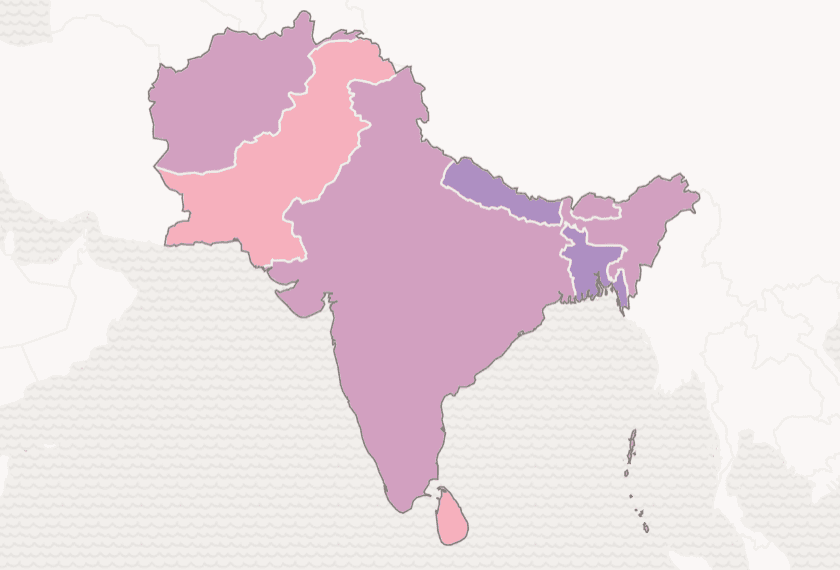
Unveiling the invisible: The urgency of Birth Registration for every child
Data is the basis for informed and evidence-based policy making. Ensuring that every child is counted – and therefore has access to services fundamental to fulfil their rights – is the basis for reliable and inclusive data. But 1 in 4 children under the age of 5 worldwide do not have their births registered. Birth registration is an identity document which gives children the key for accessing healthcare, education, and child protection services. Without birth registration, these children remain invisible to the world.
In many high-income countries where birth registration is universal or almost universal, this process is taken for granted. On the flip side, in many low and middle-income countries, lack of birth registration deprives millions of children from opportunities to survive and thrive in their lifetime.
The Child Atlas depicts the global scenario of birth registration rates. In 113 of the 178 countries with available data, birth registration rates are between 90% and 100%. In contrast, countries like Ethiopia, Somalia, Papua New Guinea, Zambia, Tanzania, Angola, Chad, Yemen, Uganda, South Sudan, and Democratic Republic of Congo have some of the lowest birth registration rates in the world ranging from as low as 2.6% to 40%. A sharp difference is seen between the rest of the world and Africa, where most of the countries with low birth registration rates are concentrated. An alarming number of approximately 96 million children in Africa, half of all children in the continent, do not have their births registered.

Lack of birth registration has plenty of consequences for children. Without birth registration, children cannot receive immunization and their families miss out on lifesaving social protection benefits. This means often children from poorer families do not receive the nutrition they need to grow and develop, have weaker immune system, and are more susceptible to contract a range of deadly diseases. Many of them cannot get admission into schools or register for exams which limits their future opportunities. Moreover, birth registration which proves the age of a child is also an essential basis to pursue legal consequences for perpetuators of violence against children. Children without a birth certificate face increased risks of child marriage, child labour, child prostitution, pornography, recruitment into armed forces as child soldiers, trafficking, and other forms of exploitation.
Evidence from 31 low and middle-income countries shows that children aged between 36–59 months who did not have a birth certificate were associated with worse nutritional outcomes and lower scores in their Early Childhood Development Index. This shows the negative links between birth registration and children’s early growth and development outcomes. This study also found inequalities in birth registration by household wealth and residence, consistent with the group-based inequalities found in disaggregated data of birth registration in Malawi as shown by the Child Atlas below. Children from low-income households and rural areas are particularly affected due to lack of knowledge on the importance of birth registration, access to registration services and costs associated with attaining one. Additionally, bureaucratic complexities and insufficient infrastructure create challenges for governments striving to ensure universal birth registration.

Digging deeper into the data reveals interesting observations on inequalities in birth registration. Gender disparities are subtle, with registration rates at 66% for girls vs 68% for boys. The rift widens in rural versus urban settings, where the gap stretches to 67% versus 71%, echoing a tale of unequal access. It is interesting to see the highest but competing rates of inequality between children from the poorest and richest households (65% and 71%) and between children with and without disability. Surprisingly, 71% of children with disabilities are registered at birth, surpassing the 64% rate for those without disabilities. This intriguing data sparks motivation for further research.
Children are more than a data point in statistical records. However, without a record of this data point, they will continue to face increased risks of exploitation throughout life. Setting up functioning civil registration system and extending it also to those children affected by inequality and discrimination is crucial to deliver on the Sustainable Development Goal’s promise of universal birth registration by 2030.
Related stories:
Related stories

How a Soap Opera Helped to Reduce Child Marriage
Child protection (CP)
Child protection (CP)
2025-12-09

Does Insurance Benefit Child Health? Lessons from 38 Countries
Health (HL)
2025-11-19